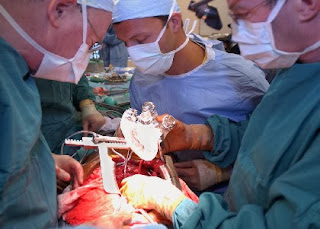Artificial heart tested in humans

Artificial heart, created by Professor Alain Carpentier French, experience in patients three Parisian hospitals, reports Medical Xpress. Body is made of synthetic materials and biological tissues and should operate without interruption for five years. Cardiovascular surgeon Alain Carpentier (Alain Carpentier) is known as the creator of the most sought after heart valve. The result of his 15-year career was the artificial heart , created in conjunction with engineers at Astrium, a manufacturer of satellites. Artificial organ consists of 900 items. He has two divisions, separated by a partition from animal tissues. In the body embedded sensors that determine what kind of load at the moment a person experiences. This information is transmitted to a miniature computer, which, in turn, instructs the pump to pump blood faster or slower depending on the circumstances. Thus regulating blood pressure and blood oxygen level of the patient, depending on his level of activity. A separate...

